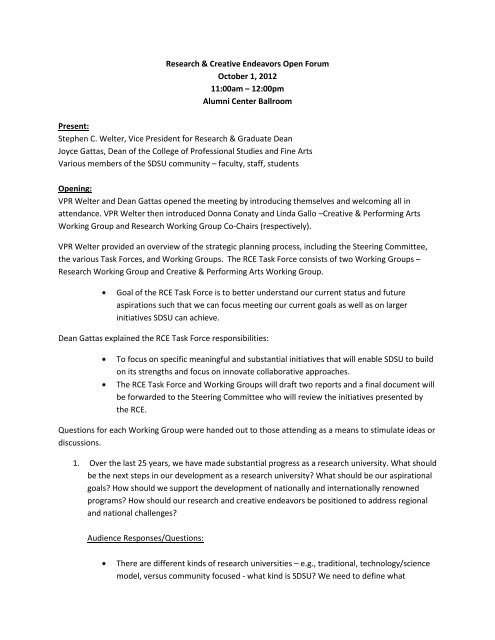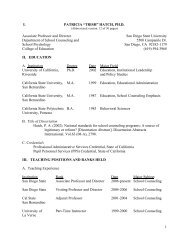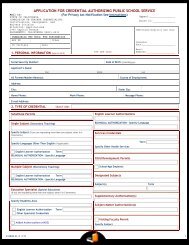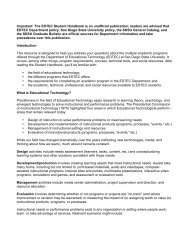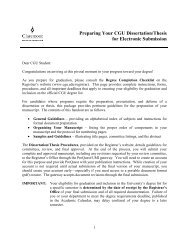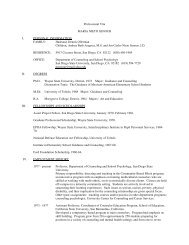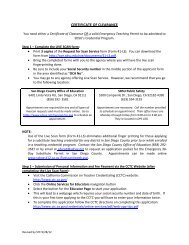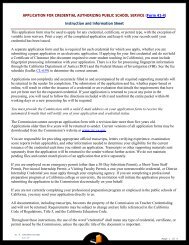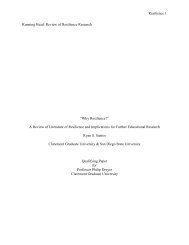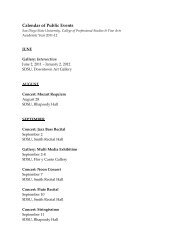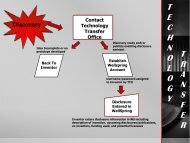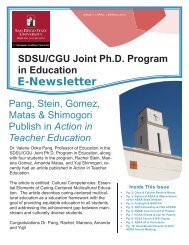Research & Creative Endeavors Open Forum meeting minutes - SDSU
Research & Creative Endeavors Open Forum meeting minutes - SDSU
Research & Creative Endeavors Open Forum meeting minutes - SDSU
You also want an ePaper? Increase the reach of your titles
YUMPU automatically turns print PDFs into web optimized ePapers that Google loves.
<strong>Research</strong> & <strong>Creative</strong> <strong>Endeavors</strong> <strong>Open</strong> <strong>Forum</strong><br />
October 1, 2012<br />
11:00am – 12:00pm<br />
Alumni Center Ballroom<br />
Present:<br />
Stephen C. Welter, Vice President for <strong>Research</strong> & Graduate Dean<br />
Joyce Gattas, Dean of the College of Professional Studies and Fine Arts<br />
Various members of the <strong>SDSU</strong> community – faculty, staff, students<br />
<strong>Open</strong>ing:<br />
VPR Welter and Dean Gattas opened the <strong>meeting</strong> by introducing themselves and welcoming all in<br />
attendance. VPR Welter then introduced Donna Conaty and Linda Gallo –<strong>Creative</strong> & Performing Arts<br />
Working Group and <strong>Research</strong> Working Group Co-Chairs (respectively).<br />
VPR Welter provided an overview of the strategic planning process, including the Steering Committee,<br />
the various Task Forces, and Working Groups. The RCE Task Force consists of two Working Groups –<br />
<strong>Research</strong> Working Group and <strong>Creative</strong> & Performing Arts Working Group.<br />
Goal of the RCE Task Force is to better understand our current status and future<br />
aspirations such that we can focus <strong>meeting</strong> our current goals as well as on larger<br />
initiatives <strong>SDSU</strong> can achieve.<br />
Dean Gattas explained the RCE Task Force responsibilities:<br />
To focus on specific meaningful and substantial initiatives that will enable <strong>SDSU</strong> to build<br />
on its strengths and focus on innovate collaborative approaches.<br />
The RCE Task Force and Working Groups will draft two reports and a final document will<br />
be forwarded to the Steering Committee who will review the initiatives presented by<br />
the RCE.<br />
Questions for each Working Group were handed out to those attending as a means to stimulate ideas or<br />
discussions.<br />
1. Over the last 25 years, we have made substantial progress as a research university. What should<br />
be the next steps in our development as a research university? What should be our aspirational<br />
goals? How should we support the development of nationally and internationally renowned<br />
programs? How should our research and creative endeavors be positioned to address regional<br />
and national challenges?<br />
Audience Responses/Questions:<br />
There are different kinds of research universities – e.g., traditional, technology/science<br />
model, versus community focused - what kind is <strong>SDSU</strong>? We need to define what
“research” is according to <strong>SDSU</strong> and the community. We need to think about rebranding<br />
our notion of research.<br />
We need to educate people about the diversity of research and creative activities taking<br />
place on campus.<br />
The Arts are part of what make <strong>SDSU</strong> a research university – the community needs to<br />
understand this.<br />
We need to look ahead 5 years and play upon <strong>SDSU</strong>’s geographical location and its<br />
attributes; position ourselves as a leading institution both nationally and internationally<br />
(US/Mexico border).<br />
Some members of the humanities faculty feel that research is prejudiced toward the<br />
hard sciences on campus (for example, the Student <strong>Research</strong> Symposium) – this is what<br />
is perceived but not necessarily intentional.<br />
Collaboration is essential – Arts, Humanities and other creative scholarly disciplines<br />
inform the Sciences and vice versa.<br />
We need to consider alternative administrative/disciplinary boundaries to facilitate<br />
integrative, innovative approaches.<br />
The lines between traditional research and the Arts and Humanities need to be<br />
softened.<br />
Considerable innovation takes place in intersection between disciplines.<br />
San Diego recently differentiated itself by rebranding as a high-tech region, which is one<br />
way <strong>SDSU</strong> can distinguish itself.<br />
We need to create a better community through engagement and innovation – create<br />
innovative partnerships with the community.<br />
Faculty should not be choosing between research and teaching – one informs the other.<br />
Faculty at <strong>SDSU</strong> are able to do both – they are highly successful at being effective<br />
researchers/teachers/scholars.<br />
Undergraduate students need to be involved more in research – this is difficult with<br />
large class sizes.<br />
Student engagement - we must provide increased opportunities for students who are<br />
interested in research.<br />
It will be important to bring faculty from different disciplines to collaborate on common<br />
themes (e.g.: sustainability); use incubators as to bring different disciplines into a<br />
common area; Allow students to take courses across disciplines/colleges to obtain an<br />
inter-disciplinary degree.<br />
Create an on-line database for faculty to post their research so as to inform other<br />
faculty of their activities, and to alert students to available research opportunities.<br />
Create “space adjacency” on campus (e.g., Zahn Center and the arts) so that faculty and<br />
students can collaborate more easily. People who are like-minded but do different<br />
research can be in closer proximity.
Specific National Science Foundation grants encourage collaboration across the<br />
disciplines – this creates substantial interest among faculty and relationships can be<br />
sustained. Although these grants are competitive, they can ultimately transform a<br />
program.<br />
2. Substantial infrastructure is required to support research and creative endeavors. This<br />
infrastructure includes library resources, facilities, equipment and administrative support<br />
services. Criteria of RPT need to be reviewed in support of cross disciplinary, collaborative<br />
initiatives. How can we invest in infrastructure so that our investments have the largest possible<br />
effect on our research mission?<br />
3.<br />
Faculty need more protected time to conduct research away from teaching.<br />
We need to determine efficient, realistic types and sources of support.<br />
We don’t have the budget or the resources to adequately accommodate faculty and<br />
undergraduate students in all areas. Consequently, we are forced to make trade-offs<br />
between areas – may need to focus our resources and research into specific areas.<br />
<strong>SDSU</strong>’s library is critically deficient in research support materials. Many faculty and<br />
students defer to UCSD’s library.<br />
VPR Welter and Dean Gattas thanked everyone for attending and providing vital input.<br />
Meeting concluded.


